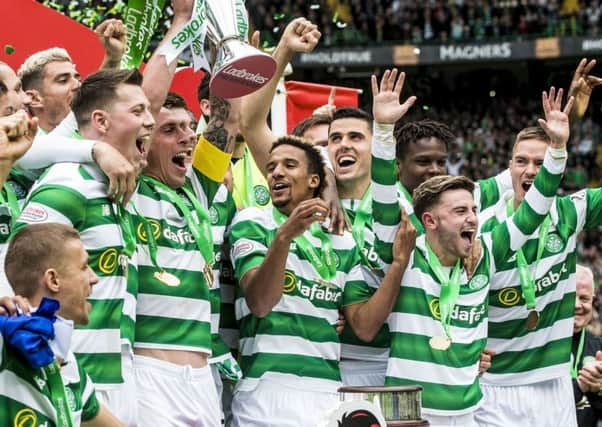Five things we learned on Celtic's march to the title
This article contains affiliate links. We may earn a small commission on items purchased through this article, but that does not affect our editorial judgement.


Never has a team operated on such a different level to all others in the Scottish top flight.
Advertisement
Hide AdAdvertisement
Hide AdThe 30 point winning margin - unprecedented, of course - for Brendan Rodgers’ men doesn’t begin to tell the whole story. Neither does the fact that they remain unbeaten across the entirety of a 38-game league campaign - unprecedented of course - with 34 wins and four draws either.
If we assume that your average league game is played over 92 minutes, with two minutes the standard added-on period, Celtic played 3458 minutes of Premiership football. Across this span remarkably they were only ever behind for 110 minutes, this total covering the mere four games this happened. They could easily have won the four games they drew, every one of them drawn from winning positions - with goals in the closing minutes costing them the victories against Ross County, Inverness Caledonian Thistle and Rangers.
Brendan Rodgers instilled a focus that was unrelenting
Even before a ball was kicked, Celtic were assured of winning their sixth consecutive title. It was a wonder that the formalities didn’t arrive until April 2. Yet after the 5-0 win away to Hearts that clinched them the title, they still had eight games to play. They did draw two of these, but the 2-2 scoreline against Ross County was only penalty awarded against them in error. All recent previous runaway champions have endured a form dip in games that didn’t matter. The closest parallel to Brendan Rodgers’ first season at Celtic is provided by Martin O’Neill’s treble-winning campaign of 2000-01. O’Neill’s team blitzed the title with the loss of only one game while it was a live issue. Yet, the subsequently lost their final two, meaningless, league games.
Celtic were an irrepressible attacking force with such variety in their goalscoring
Each and every one of the 13 outfield players with the highest number minutes on the pitch for the club in league games succeeded in find the net in the title romp... perhaps to be considered hardly a surprise with their Premier-era record 106 total scored. There seemed to be an endless number of goal sources in Rodgers’ squad, which is reflected in the fact that, across all competitions, no fewer than six players hit double figures: Moussa Dembele, Scott Sinclair, Leigh Griffiths, Stuart Armstrong, Tom Rogic and Patrick Roberts. Even in the free-scoring Martin O’Neill era, the best the squad could muster was five scorers in double-figures. Another respect in which Brendan Rodgers side have set new standards for recent times.
Continuity is not a concern when you can count on universal competence
The football mantra is that consistency of selection is key to success. This season, though, it didn’t seem to matter who Brendan Rodgers slotted into the team; results remained the same. Or, rather, they just kept winning. Certainly, there were integral performers such as Scot Sinclair, Scott Brown, Moussa Dembele, Stuart Armstrong and Tom Rogic. In some of the club’s best display, though, these big performers had no involvement. Rodgers rested eight players for a trip to Ross County during the club’s Champions League campaign. The outcome was a 4-0 victory. Dembele - scourge of Rangers after a derby debut hat-trick - was lost before the recent trip to Ibrox... only for Celtic to register their biggest ever win at the ground. Rodgers’ full-backs Kieran Tierney and Mikael Lustig are pivotal players in his system. Yet he has dropped in Emilio Izaguirre and Cristian Gamboa in for certain games without a notable loss of fluency. That is true of every area of the pitch. He has somehow franchised his full squad and rarely been let down when bringing in a player for the first time, or after months without an appearance. There was a near three month period earlier this year when he almost never played the same time two weeks running, which was cited as one of the downfalls of predecessor Ronny Deila. The belief bred by winning is important in shuffling your squad successfully, but the team structure for which Rodgers is responsible has been a more central component in allowing for such flexibility.
Brendan Rodgers as architect has also been a master builder
The transformative effect that Brendan Rodgers has had on Celtic despite only adding a couple of player has brought comparisons with Jock Stein, who turned Celtic into European champions after inheriting 10 of the players who made up the Lisbon Lions. We are talking apples and pears here with the Scottish football scene at one of its lowest ebbs in history. However, if this weekend Celtic complete the treble and become the first team to go through an entire domestic campaign without losing a game, the feat should be recognised for the extraordinary achievement it would be. And it is Rodgers ability to revitalise, remake or rapidly accelerate the talents of those at his disposal that has underpinned a remarkable first season for the Irishman in Scotland. There is unlikely to be a single player in the Celtic squad who would say they haven’t improved in the past 12 months. Figures such as Scott Brown, Stuart Armstrong, Dedryck Boyata and Callum McGregor are unrecognisable from the forlorn performers of 12 months ago. Others such as Patrick Roberts, James Forrest, Kieran Tierney, Jozo Simunovic and Leigh Griffiths just looked to have stepped their games up notably. That is a huge testament to the coaching prowess of Rodgers, who has hardly put a foot wrong on and off the field in how he has handled the challenges, the media and the requirement to be a leader to a squad and a support.
